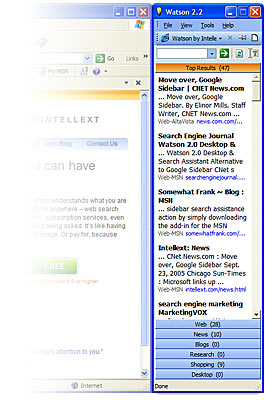Blinkx Pico - real -time contextual search


Pico appears as a small row of icons in the title bar of the active window. A progress bar indicates a scan is in progress and when complete, icons representing each of the data sources light up if a relevant match is found. A click on one of the lit icons displays the found results. Pressing ALT+1 opens a full page display of all found results.
I find Pico a lot less intrusive that Watson which continually updates content and creates a substantial amount of visual distraction when displayed. The new Blinkx offering also seems to create less of resource drain than Watson. In all fairness, Watson produces a much more extensive set of results so there is a trade-off to be considered, as there almost always is with tools like this that churn away constantly.
Frankly I don't think either of these tools quite gets the job done in their current form. But they do represent an important step forward in leveraging the vast amount of information available on the Net in context to what you're currently focusing on. As the ability to map keywords evolves and sematic recognition algorithms improve, this capability will become increasingly useful. Either is worth taking for a test drive to see how much value they might deliver for the kind of work you do.